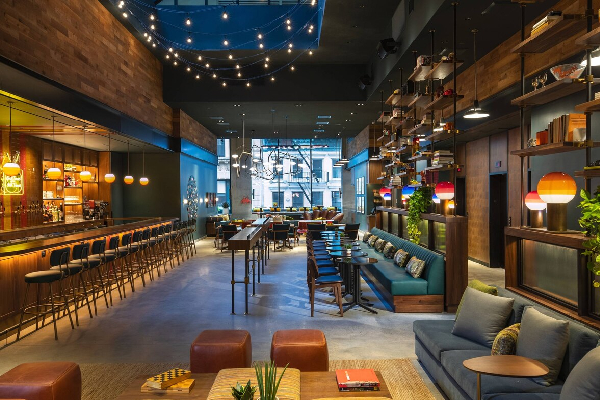After a rapid rebound in U.S. economic growth during Q2 2021, news of the fast-spreading Delta coronavirus variant over the past several weeks has created a cloudier outlook. Today, there are two perspectives from which to dissect the near-term future, namely glass half empty or glass half full.
Contributed by Daniel Lesser, president and CEO, LW Hospitality Advisors, New York City
Generally, the commercial real estate market in the U.S. is flourishing as asset values declined far less than during the Great Recession of 2008/2009 and have already reversed course into a recovery. In addition to federal government support of the economy, thus far lenders have been flexible with forbearance terms and have avoided widespread foreclosures.
Copious amounts of all types of debt and equity are available from domestic and offshore entities that currently perceive U.S. hotels as desirable acquisition and investment opportunities, particularly due to the notion of being able to continuously raise rooms rates during an inflationary environment. Furthermore, rescue capital to provide needed liquidity for hotel owners to retain their assets is competing with opportunistic investors seeking distressed investment plays. Although both acquisition and rescue capital groups have similar investment objectives to generate alpha returns, rescue focused funds that offer preferred equity, mezzanine debt and/or fresh joint venture money tends to be oriented to short-term hold positions.
Recently, several high-profile institutional rescue capital transactions have enabled lodging ownership platforms to optimize their operational and financial flexibility, while navigating the current economic environment. Additionally, these deals allow for strengthening of balance sheets, and the creation of pools of capital with which strategic growth prospects can be pursued. Cases in point during the recent past include:
- A joint venture between Ascendant Capital Partners and Oaktree Capital Management invested US$200 million of preferred equity capital and a commitment of up to an additional US$250 million of new preferred equity capital over 18 months in Watermark Lodging Trust.
- ACORE Hospitality Partners, an affiliate of ACORE Capital LP, invested US$200 million in a preferred equity position in AJ Capital Partners affiliate Graduate Hotels.
- Ashford Hospitality Trust secured a strategic financing commitment from funds managed by Oaktree Capital Management to provide a US$200 million senior secured term loan that can be upsized by US$150 million to an aggregate amount of US$350 million.
- Hospitality Investors Trust, a publicly registered non-traded REIT formerly known as American Realty Capital Hospitality Trust, filed for Chapter 11 bankruptcy to reorganize US$1.3 billion of unsecured debt, and entered into a restructuring support agreement with its largest investor, Brookfield Strategic Real Estate Partners II Hospitality REIT II.

Recent noteworthy lodging sector single asset strategic defaults (aka jingle mail) and foreclosures reflects sponsors and/or lenders losing patience waiting for room night demand to return. Examples during the recent past include:
- Sunstone Hotel Investors executed an agreement with the holder of a mortgage loan secured by the 476-room Hilton Times Square in New York City. In exchange for a US$20 million payment, the credit of approximately US$3 million of restricted cash held by the noteholder, the assignment of Sunstone’s interest in the hotel, and the retention of certain potential employee related obligations, Sunstone satisfied all outstanding debt obligations, including regular and default interest or late charges.
- Mack Real Estate completed UCC foreclosure proceedings against the owners of a seven-hotel portfolio in Manhattan, a joint venture between Hersha Hospitality Trust and Chinese investment firm Cindat Capital Management.
- The relatively new 61-room Park James Hotel in Menlo Park, California, proximate to the headquarters of Facebook and Google, and near Stanford University, has been seized by Bixby Bridge Capital, a private real estate investor whose specialties include the purchase of delinquent property loans.
- A New York State Supreme Court has granted a group of lenders led by Natixis SA the right to foreclose on the 452-room The Times Square Edition hotel in New York City that also includes retail space and digital signage.
- Foreclosure lawsuits against the owners of Chicago, Illinois-area hotels include the JW Marriott Chicago, the Palmer House Hilton Chicago, the Felix Hotel, the Holiday Inn Chicago Magnificent Mile and the Hilton Orrington in downtown Evanston.
- Motcomb Estates, an investment vehicle for billionaire brothers Simon and David Reuben, is pursuing the UCC foreclosure against the 190-key West Hollywood Edition in West Hollywood, California.
- Ladder Capital sold the Washington Park Hotel in Miami Beach for US$43.8 million, after foreclosing on the property when it was owned by the Witkoff Group.
- Ahead of a planned foreclosure auction of the Hyatt Regency Austin hotel, Host Hotels & Resorts purchased the property for US$161 million in cash.
- The developer of the Moxy NYC Downtown hotel in New York City transferred ownership of the property to its lender AllianceBernstein.
- German lender DekaBank foreclosed on the New York Marriott East Side hotel in New York CIty due to a defaulted US$53 million mortgage.
An inflection point will soon be reached where both lenders and borrowers have no more to “give,” and loan defaults and foreclosures are expected to increase as forbearance periods end. Furthermore, an uncertain recovery trajectory coupled with looming capital expenditures and property improvement plans may force owners to finally capitulate, as many lenders will ultimately lose patience and demand recapitalization and/or enforcement of their remedies.
During the remainder of this year, and well into 2022, expect more hotel sale transactions, as well as more deployment of rescue capital for troubled lodging deals. Working out distressed hotel assets will take time beyond even when sector supply and demand metrics stabilize, which could be several more years.
Savvy investors who deploy capital into U.S. hotels at market pricing, and if need be, are ready, willing, and able to hold for 10 years, will invariably achieve superior risk adjusted returns when compared with other asset classes.